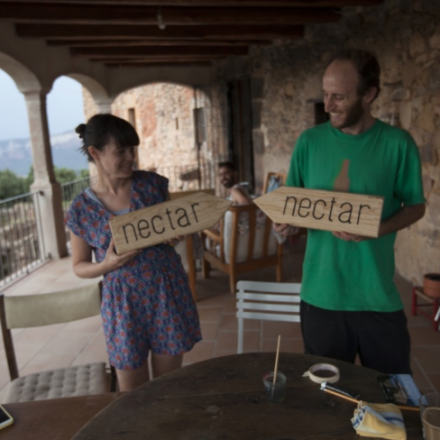
The managers of Nectar, a rural coworking and coliving space, as they themselves define it, are currently holding their first summer camp, The Building Camp. The idea is a step beyond what is today understood as coworking, in which different professionals share a common work space and occasionally come together, as Nectar is a 16th-century country house located in the Guilleries-Savassona (Osona) natural park where the work of restoring the house is combined with the freedom of each participant to do what they want.
The Building Camp project accommodates 10 people (professionals from the fields of architecture, art, interactive design and international relations, among others) who are interested in this experience thought up by the entrepreneurs Tai Lomas and Olga Sureda. "Our proposal is an alternative to the way we have lived until now, it is different. It is a collaborative project," says Lomas in his interview with VIA Empresa.
This first initiative from Nectar is proving to be very satisfactory. There was a lot of interest in this project that costs the participants nothing: Nectar provides them with accommodation and upkeep and they provide their work to gradually restore the house. In fact, on Tuesday they worked on laying the floor. Each and every one of the jobs is a long-term challenge that those who conceived it hope can be developed in other editions and projects."It is about building Nectar together, the spaces, but also the programme and the ideas for collaborative projects. We are happy because there has been a lot of interest from a range of people, interesting people from many countries. There are local people but also people from the Netherlands, Germany, England…," Lomas points out.
For her part, Sureda highlights the variety in the professional profiles of the people who have come together in the same space. "We were interested in having different profiles so that we can learn from each other. We did not know how it was going to work but everything has gone smoothly. When you put people together, even if they are not from the same profession or country, but people who like a challenge, the result is very interesting," she says.
According to Sureda, in Nectar they are looking to make "flexible and human spaces, with rules that promote coexistence but with the comforts needed for other ways of doing things," says the entrepreneur, who adds that Nectar is one of the first coliving projects in Catalonia and an example of how, little by little, the line between private and working life is becoming blurred.
 |
| Image of the work being carried out these days in The Building Camp. Nectar |
It is a line that has also been blurred by the proposal from MyTwinPlace, the home exchange platform that this winter, as part of the MWC, began the programme for entrepreneurs in which they put each other up. The fact of living for a few days with another person who is also in a process of full creativity to help find common points, ideas and ways of combining was a success. In short, the idea is to network but according to a specific philosophy: "We came out of the idea of democratising the travel market so that money was not an obstacle to getting to know the world," says Maitane Rodrigo, the communications head.
New proposals are emerging from amid the wide range of options offered by new technology, as Josep Cano, founders of LoftCowork, points out: "The evolution is tied to new technology. The work space was initially set up in an area of the home and that worked well for a while, but over time people realised that everyday life does not allow you to do everything. Now everything revolves around a different perspective," says this interior designer and head of a space in the Poblenou areas of Barcelona.
A new proposal from Berlin
From Berlin comes a proposal by Welance, a coworking space that was set up in the German capital in 2010 and that is now also in the Catalan capital in a centre in the Born neighbourhood. Daniel Quílez, the Barcelona head, insists that "the fact that there is increasingly more specialisation has brought about more projects, which have allowed us to each develop different projects. We are all freelance, we establish a horizontal structure and the responsibilities are shared by everyone," he points out. The apartment in which Welance is housed includes offices and meeting rooms, useful for both freelance and group work. Moreover, because of the Berlin connection, Welance Berlin users can be accommodated in Barcelona, and vice versa.
"It is increasingly important for people that they do not have to go to the office every day to do their work, this is what the survey shows," says Quílez with the results in hand from the First Nomad Survey, which reveals that 64% of these itinerant workers are men, 55% of whom maintain contact and 33% of whom are in their thirties. Among their users are liberal professionals like lawyers, but also musicians and people from the world of technology.